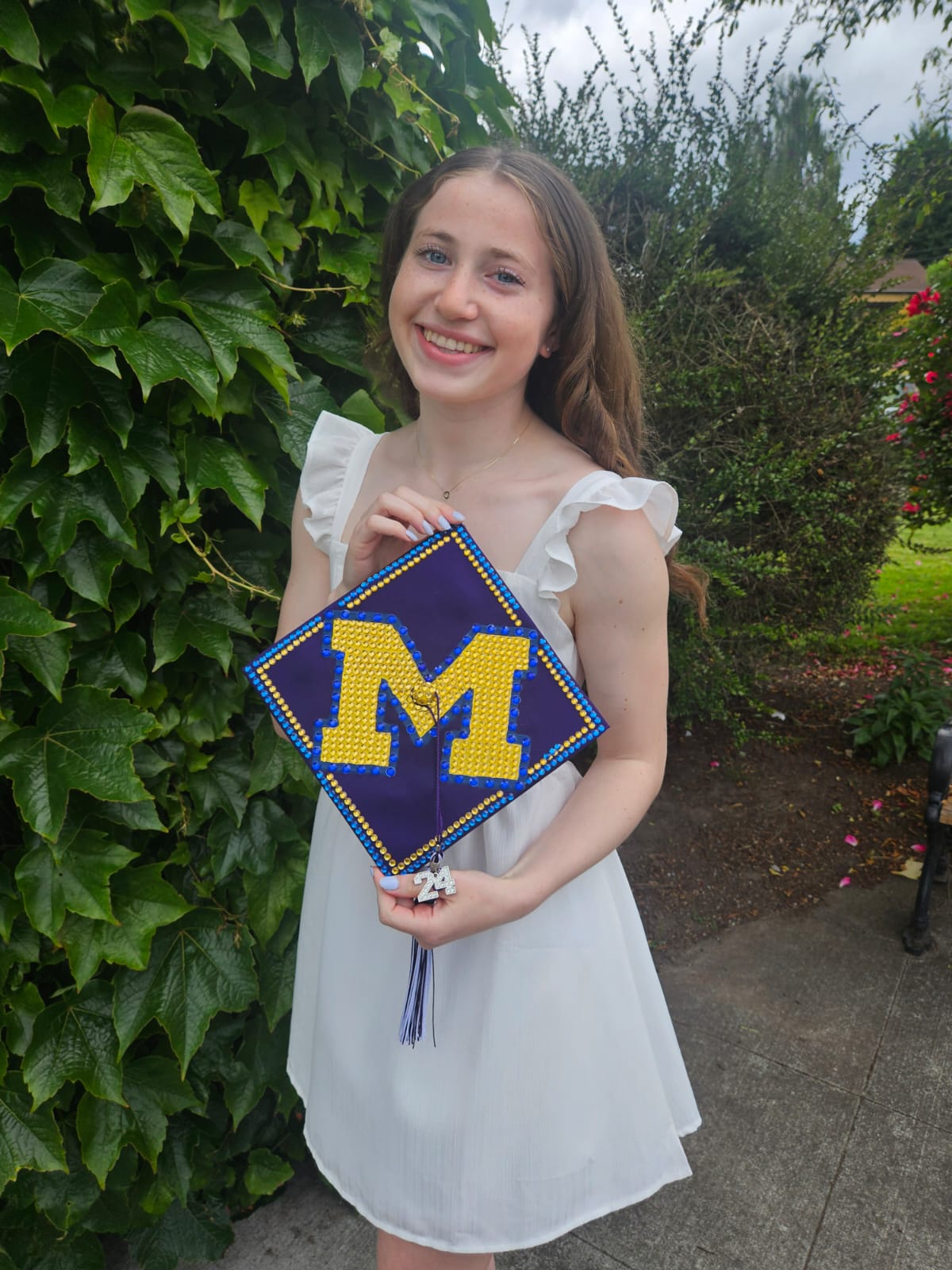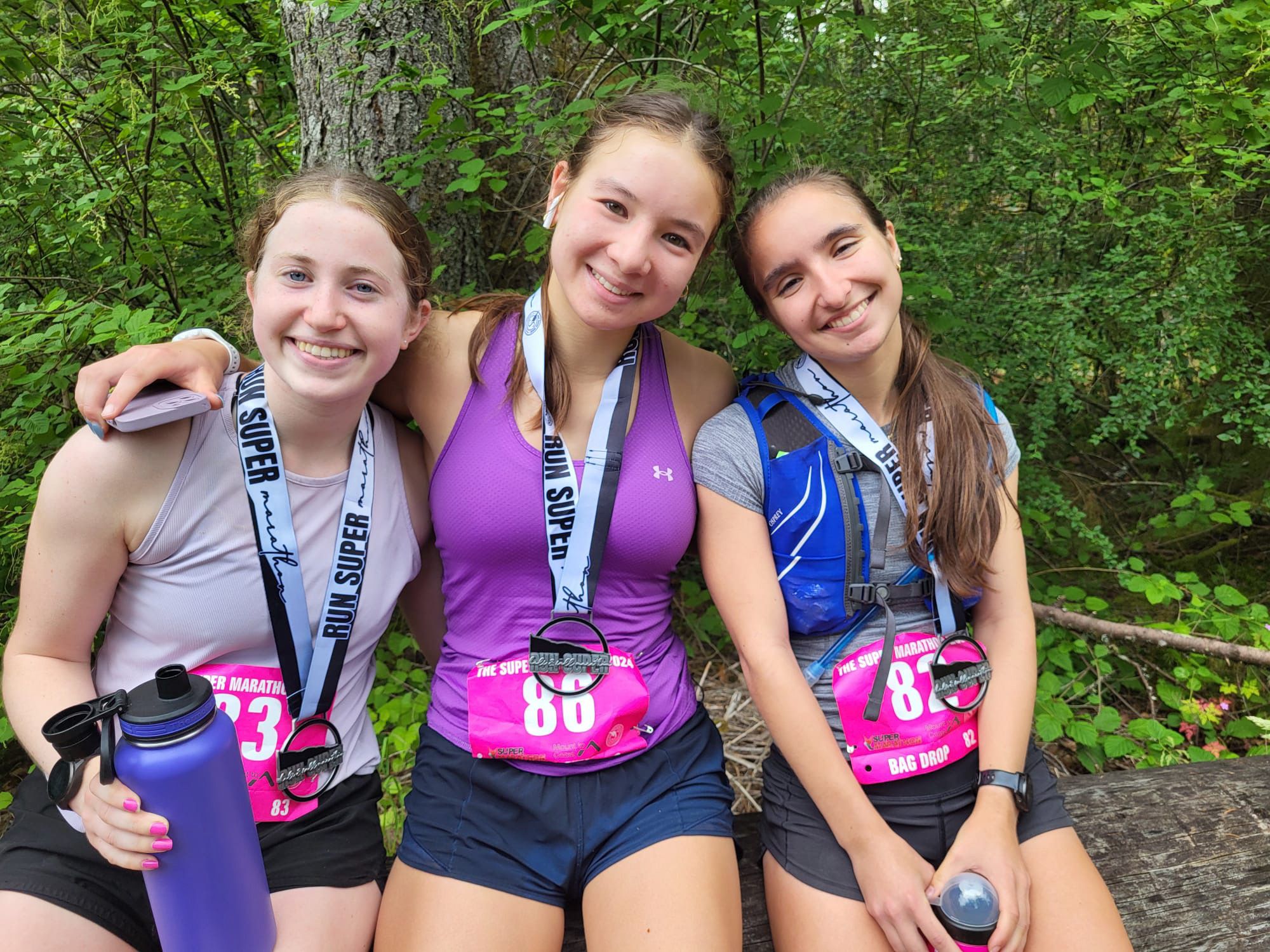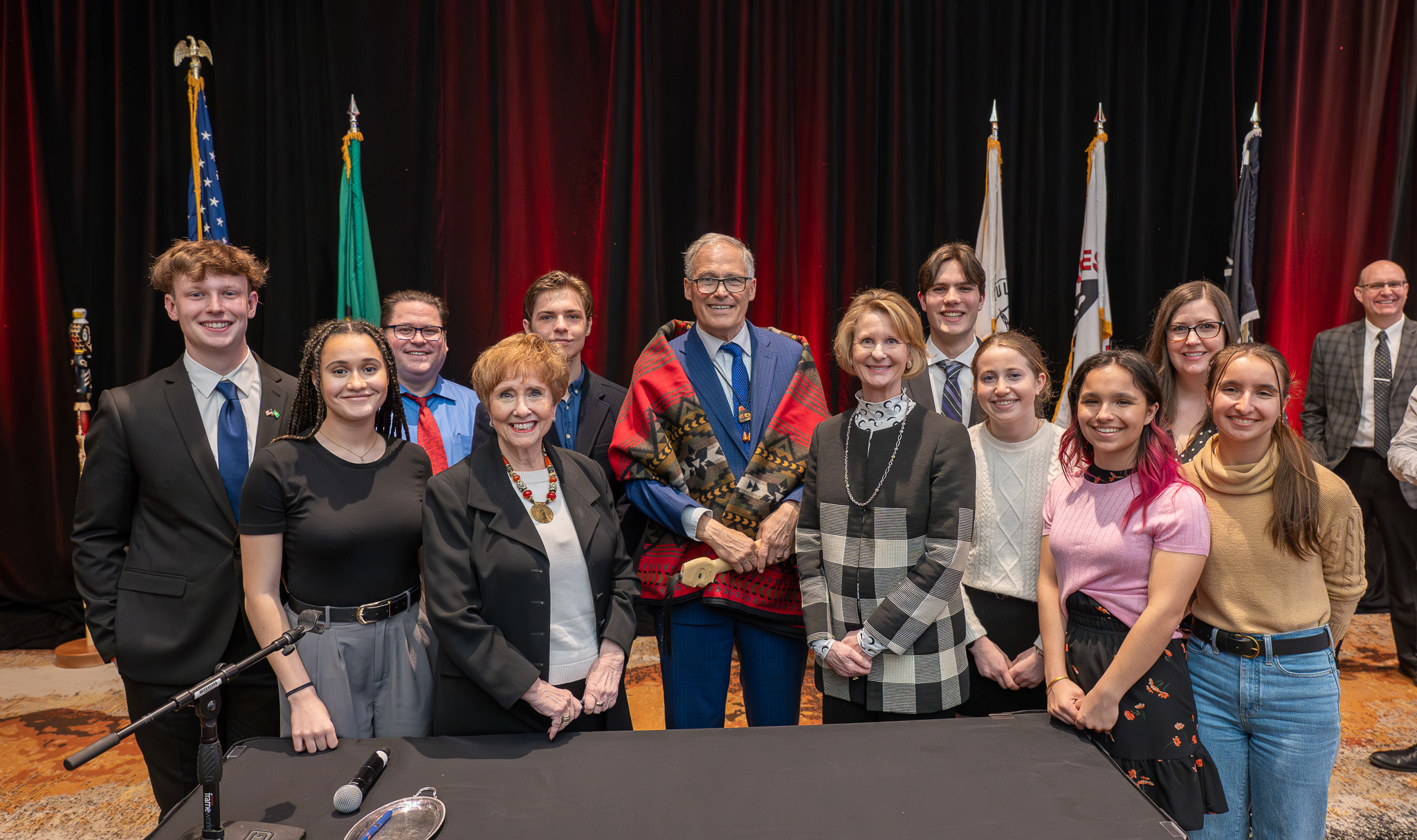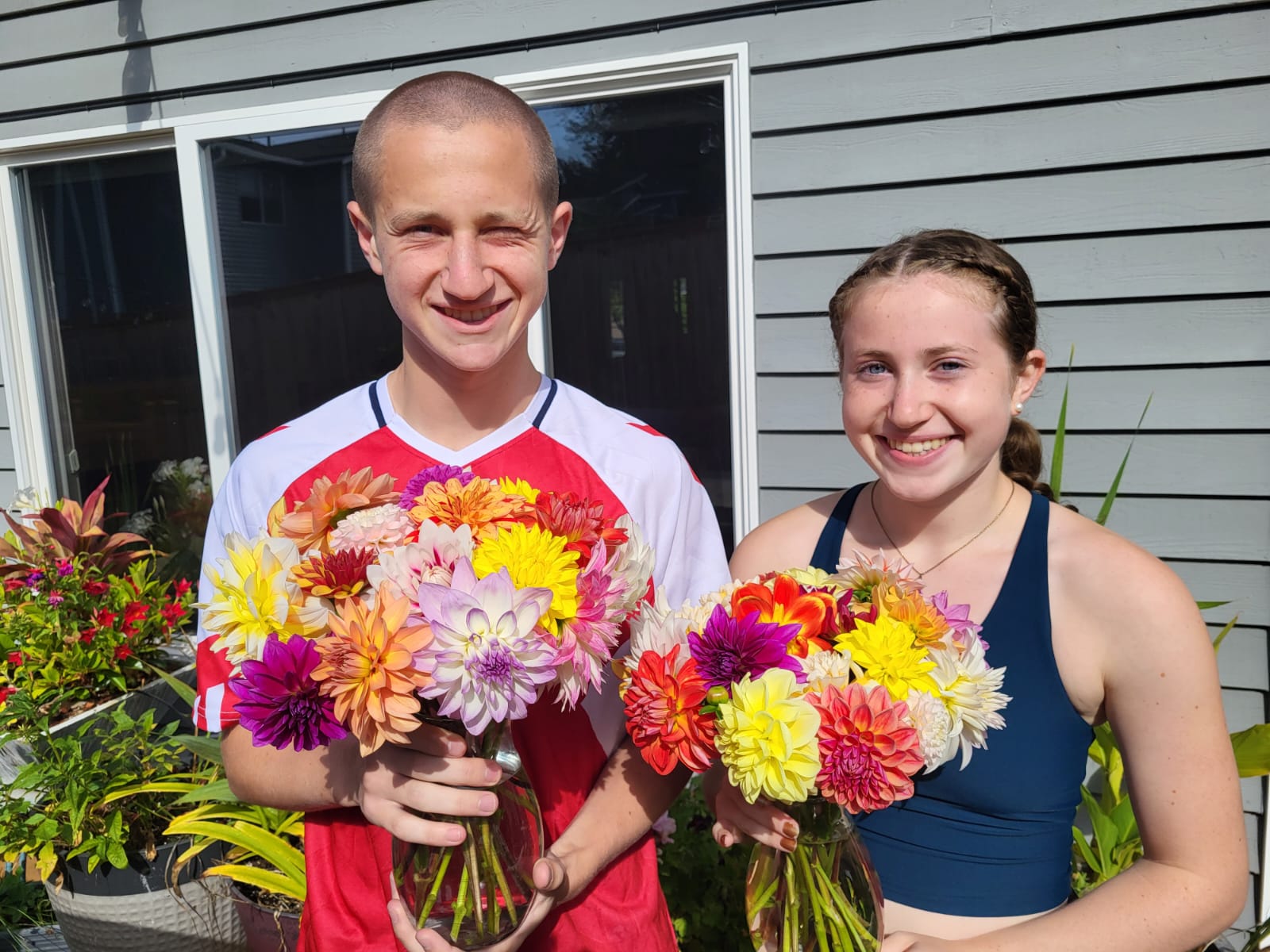
 Back to Profiles
Back to Profiles
Olivia Milstein

Kinesiology Merit Fellowships are given to select students who have demonstrated a commitment to diversity in the academic, professional, or civic realm through their work experience, volunteer engagement, or leadership of student or community organizations. Read on to learn more about one of them.
Q: What brought you to U-M?
A: It was really the School of Kinesiology. For a while, I’ve known I wanted to do something in the sport industry. When I was looking into schools, I was researching sport management programs but also exercise science programs. It only takes a quick Google search to see that the University of Michigan is way up there at the top for both. So the School of Kinesiology was definitely one of my main reasons for coming to Michigan.
And then also the connections. You hear all the time about Michigan's amazing alumni base and all the people who care to be at Michigan and put themselves there. I wanted to be around other people who wanted to be there but also a place that would give me connections to people who were really important in the industry that I wanted to work in and the opportunities that come along with that.
The sports culture was another thing. I love sports — it’s one of my main passions — so a school with a big sports culture was super important to me, and Michigan checks that box, for sure.
And then I'd also say I wanted something new. I'm from the state of Washington, so a bit far away. This was definitely a big jump for me to come here, but I wanted to challenge myself and be at a place where I think I can grow, and Michigan is the place where I can do that the most.

Q: You said you’ve known that you’ve wanted to work in the sport industry for a while. Any specific path yet?
A: I haven't taken a ton of classes, so I haven't narrowed it down yet. I actually got into the School of Kinesiology for applied exercise science. I thought initially that that was the route I wanted to take, but the more thinking I did, the more I realized the type of things I want to do are more in sport management so I switched my major to SM. One of my favorite things about sports is the community aspect. So based on the couple months that I have had here, I could envision myself in partnerships or maybe sponsorships. Also, I'm a huge fan of soccer; my family is a big soccer family, and I love women's sports. So working for the National Women's Soccer League is a goal I'd say I have.
Q: What's the college experience been like for you so far? Has it met your expectations?
A: Honestly, I came in with no expectations. I just figure that whatever is going to happen is going to happen. So I've gone in with an open mind. I asked people, ‘What's your advice for first years?,’ and they said to say yes to everything. So I've tried to do that. I've joined some clubs, which has been great to build community. No one from my school came this year to Michigan besides myself, so finding friends was something I was worried about. It's definitely a challenge, coming from far away and having to start fresh. But it's a challenge that I like, and it's a challenge I knew I was getting myself into. So far, it's been a great experience. I've loved getting to meet new people with backgrounds that are so different from mine and getting to see what Michigan's all about.
Q: That’s great. What kind of clubs have you joined?
A: I've joined the Sport Business Association. I feel like a lot of people in the sport management major are part of that one. And MWESE (Michigan Women Empowerment in Sport and Entertainment). We've gotten to talk to some really cool people there. In high school, I danced and I ran cross country. So here, I joined MRun, and I’m in a dance club. And then additionally, back home, I worked with a nonprofit that helped provide sports and sports mentors to kids so I wanted to try and find something similar here. I got lucky; I found this one group called Gear Up for Good, and they help give sports equipment back to people in the greater Ann Arbor/Detroit area that need it.

Q: Very cool. You’re one of only a few Kinesiology Merit Fellows this year; how has that been helpful so far?
A: Out-of-state tuition is a bit brutal. I'm lucky that I come from a family where my parents always try and support my brother and me and whatever we do, so I feel very, very grateful for that. But also, there's a bit of guilt that my family now has this significant financial burden.
I knew Michigan was the place for me so when I got in, my parents told me that they wanted me to follow my dream. I’m really grateful for that. But it's a lot of money, and I have a younger brother, and I want him to be able to do whatever he wants to and benefit from the opportunities that my parents gave me. So really, this merit fellowship takes a little bit of the burden off of my family. When I found out I got it, I remember I ran to my dad and was like, ‘Look at this!’ I was so grateful.
Q: In your application for the Kinesiology Merit Fellowship, you mentioned being involved with passing a law around Naloxone in your home state of Washington. Can you tell me more about that and whether you can apply anything you learned from that experience to your sport management classes?
A: For sure, that’s an experience I really love talking about. It started as a project for my AP Government class called Capitol Classroom. We got into groups of about eight, and we had to come up with a piece of legislation and propose it to a senator or representative. We all went into this group because we cared about Naloxone, or Narcan, in schools so we proposed that every single school in Washington, K-12 — public, private, it didn’t matter — always had to have at least two doses of Narcan on the premises at all times. At the time, the law was that only high schools in districts of 2,000 or more kids had to have it, which didn’t make sense to us; that was only about 25% of students in Washington.
We proposed it to state senator Patty Kuderer, and she really liked the idea and put it into consideration to go through the Senate. It’s Senate Bill 5804. We drove down to Olympia to support it, testified for it, spoke to journalists, promoted it, explained why it was important. It passed through the Senate and the House unanimously. We were super lucky; we got to go and watch and take a photo with the governor as he signed it into law.

Through the experience, I learned that you have to be willing to work super hard to promote what you think is important. And to me, getting Narcan in schools was really important because there are kids who unfortunately do pass away in high schools, middle schools, even elementary schools because of this. So I was willing to essentially do whatever it took to get this legislation passed, whether that was staying after school to talk to a reporter or driving to Olympia at 5 a.m. one day to testify for the bill. Essentially, what it taught me is that hard work can take you places. I hope to translate that into everything I do.
Another thing I learned is: Don't be afraid to do something just because you think you're too young. There were so many comments made at the legislature to the effect of, ‘Oh, my gosh! We have high schoolers in our audience!’ But really, as long as you put in the effort and the research, as long as you care enough about it, you can do difficult things.
And finally, making sure that kids feel safe at school is incredibly important because it's hard to learn if you don't feel safe. That was something that we really cared about. I feel like that translates to college campuses, too; students have to feel like they have a safe, inclusive environment in order to produce their best work. So I hope, being here at U-M, I can help create that in some aspect. I'm not sure exactly what that looks like yet, but being kind and hardworking is something that I try and do every day.
Q: Wow, that’s awesome. Do you think college students should have some element of that level of civics education about the communities where they live, too?
A: For sure. I feel super grateful for the high school that I went to because my AP Government teacher — shout out, Mr. Dawson — he promoted that if you want to make change, you're probably not going to be able to go to D.C. and do whatever you want to do. But you have this opportunity in your community to make a change because people there are so much more willing to listen to you. It was very much taught to us to start with your own immediate circle and focus on problems that affect you or your community, and then it’s much more meaningful when you see change. And maybe it can grow from there.
We learned about so many ways to make things happen: You can email your representatives; you can go talk to people; you can testify. But that isn’t really taught to a lot of people.
So I definitely think it’s important, especially with kids in high school. They see the issues, and they’re itching to make change. But they feel like they can’t do it because they’re too young. I think that’s actually a great age to do something because if people see a kid that’s passionate, they’re like, ‘Wow, maybe we should do something if there’s people this young who feel that something needs to be changed.’
And college kids, too — if they learn about what they can do to be civically engaged, they’re more likely to do it. Go to your town hall, bring up an issue, research a bit so you have a deeper understanding besides your own perspective. And keep talking about it. If it doesn’t happen, it doesn’t happen. But you’ll be surprised to see the amount of people who are on your team and who want you to succeed and your idea to succeed.
Q: You’re inspiring me already! You also mentioned another organization you were involved in in high school, that provides sports and sports mentors to kids, that you wanted to find an equivalent for here at U-M. Can you tell me more about that experience?
A: For sure, another thing I love talking about. The organization is called Rainier Athletes, and it’s based in the Seattle suburbs. It gives access to sports and mentors to kids in underprivileged communities. My dad has a hobby of growing flowers, and my brother and I would help out and sell them to family and friends and whoever wanted them, and we decided to donate all of the money to Rainier Athletes.

A few years ago, I interned with them; they’re a nonprofit, and they don’t have a big staff, and I just wanted to help because I believe in their mission. And then for the past two years, I was a mentor. So once a week, I met with this young girl — she's great — for 30 or 40 minutes. We talked about everything from school to sports; if she needed help with something, I'd help her with it. It was an awesome experience.
Gear Up for Good isn't the exact same as Rainier Athletes, but I think they both have similar missions in that they want to help make sure that every kid can have access to sports, which is something that has benefited my life so greatly.
Q: That’s so lovely! That makes me wonder why you wanted to go into sports as a career.
A: My parents put me in dance when I was two. I did soccer for a while. I did basketball. In high school, I did both cross country and dance. I've always done at least two sports because it makes me fulfilled. It's taught me so much, whether that be about friendships or leadership or how to conduct yourself as a nice and genuine person.
A lot of times, the emphasis is placed on winning and competitiveness, and my parents will be the first to tell you I'm probably one of the most competitive people you'll meet, but honestly, one of the major things that I take away from sports is the friendships. You meet great people, and you build a community. When I was trying to figure out what I wanted to do, I realized the one thing that's been a constant in my life, and it's been sports and my love for sports. So I thought: Why don’t I create a career out of this and help people feel what I feel for sports and gain what I've gained from sports? Yes, it’s competition; yes, it’s a game. But it’s so much more than that.
When I was trying to figure out what I wanted to do, I realized the one thing that's been a constant in my life, and it's been my love for sports. So I thought: Why don’t I create a career out of this and help people feel what I feel for sports and gain what I've gained from sports?